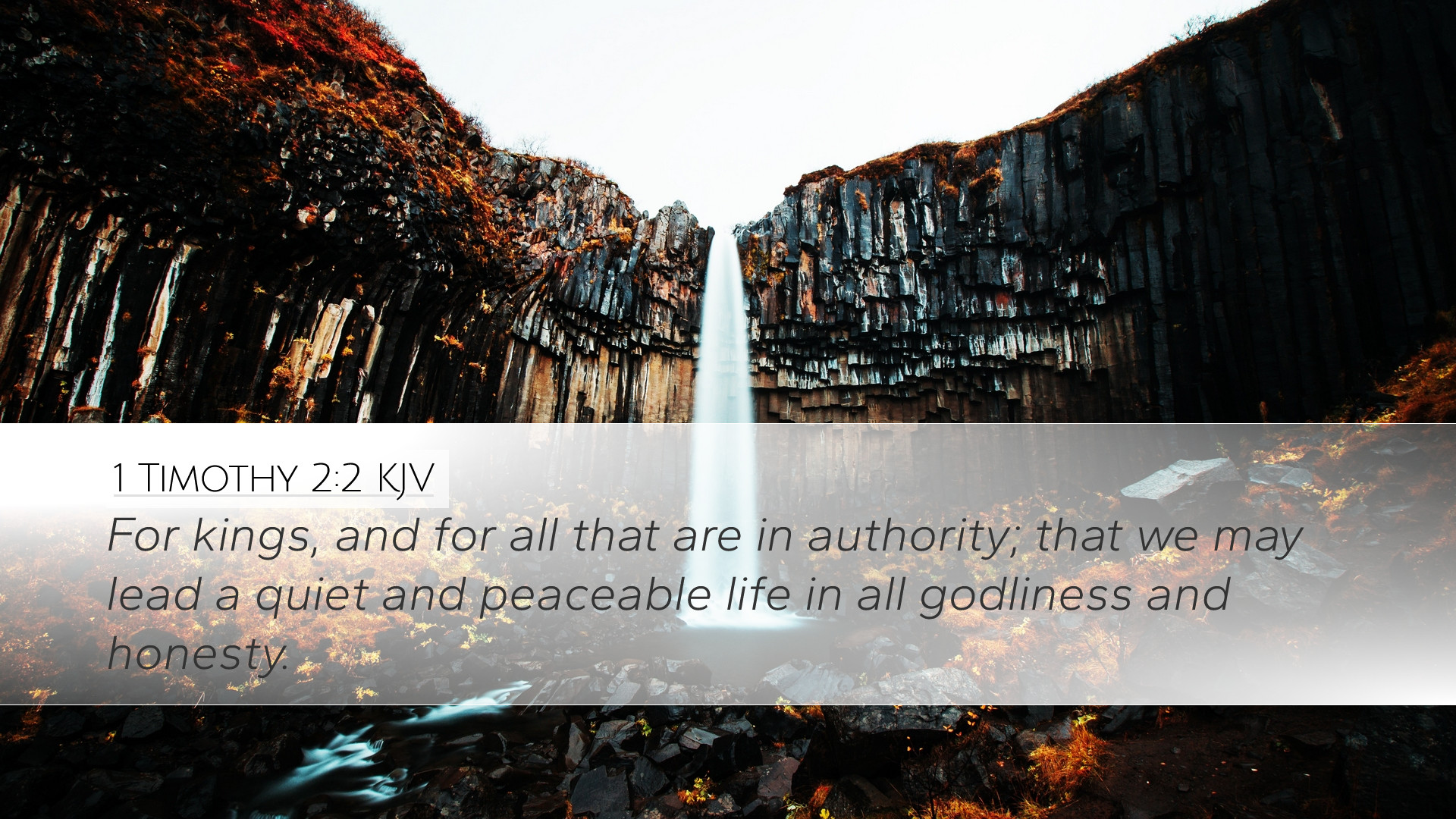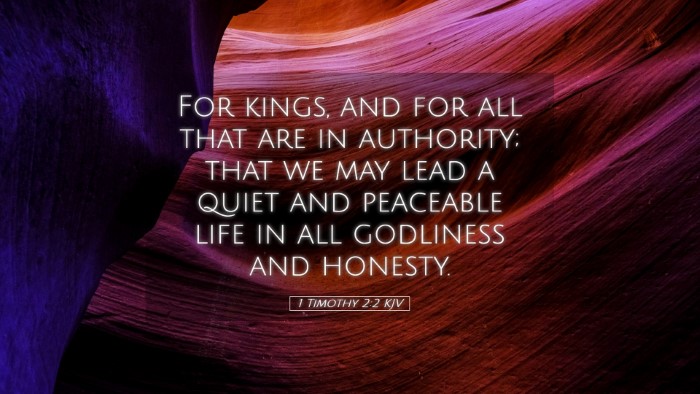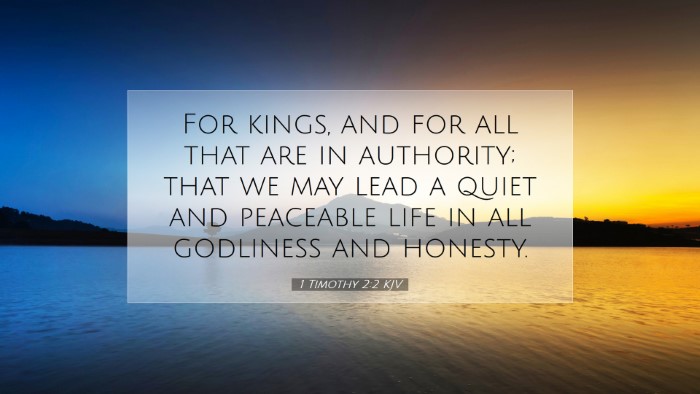Old Testament
Genesis Exodus Leviticus Numbers Deuteronomy Joshua Judges Ruth 1 Samuel 2 Samuel 1 Kings 2 Kings 1 Chronicles 2 Chronicles Ezra Nehemiah Esther Job Psalms Proverbs Ecclesiastes Song of Solomon Isaiah Jeremiah Lamentations Ezekiel Daniel Hosea Joel Amos Obadiah Jonah Micah Nahum Habakkuk Zephaniah Haggai Zechariah Malachi1 Timothy 2:2
1 Timothy 2:2 KJV
For kings, and for all that are in authority; that we may lead a quiet and peaceable life in all godliness and honesty.
1 Timothy 2:2 Bible Commentary
Commentary on 1 Timothy 2:2
Verse: 1 Timothy 2:2 "For kings and all who are in high positions, that we may lead a peaceful and quiet life, godly and dignified in every way."
Introduction
This verse sits within the broader context of Paul's exhortations to Timothy regarding worship, prayer, and the conduct of the church. It emphasizes the importance of intercessory prayer for leaders and the resulting impact on the Christian community's ability to live in peace. As we analyze this verse, insights drawn from various public domain commentaries will deepen our understanding.
Contextual Analysis
Timothy, a young pastor in Ephesus, receives instructions on how to guide the church. This verse illustrates the vital relationship between the church and civil authorities. The call to pray for 'kings and all who are in high positions' underscores the necessity of divine guidance over earthly leadership to maintain societal order.
Matthew Henry's Insights
Matthew Henry emphasizes that this command is a divine directive for Christians to engage in prayer for all forms of authority. He notes that praying for rulers is crucial because their governance affects the circumstances under which Christians live. Henry asserts:
- Prayer as a Responsibility: Believers are called to uphold all leaders in prayer, recognizing that their actions can profoundly influence public peace.
- Peaceful Living: The logical extent of these prayers is that they enable Christians to live 'a peaceful and quiet life.' This peace facilitates the growth of godliness and dignity within the church community.
Albert Barnes' Commentary
Barnes elaborates on the significance of praying for kings and authorities by indicating that such prayers are a means of seeking God’s favor for the nation. He delineates several essential points:
- Appointing Leaders: Barnes points out that God appoints leaders and that their policies can impact spiritual and social stability.
- Living in Godliness: The call for a peaceful existence promotes an environment where the church can thrive spiritually and morally.
He notes, "Prayers for rulers are especially needed in times of oppression or tyranny." This reflects the church's duty to uphold justice while remaining subjects to God's sovereign control.
Adam Clarke's Commentary
Clarke provides a deeper exploration of Paul's instruction by addressing the socio-political climate of the time. He observes:
- Paul’s Strategic Imagination: Clarke emphasizes that Paul’s directive was strategic, aimed at preventing unrest and hostility toward Christians by promoting a spirit of prayer and submission.
- Universal Responsibility: Clarke posits that this prayer should extend beyond national borders, suggesting that Christians are responsible for praying for leaders in all nations.
He remarks that such prayer reflects the heart of Christ, who desires all people to be saved and come to the knowledge of the truth (1 Timothy 2:4).
Theological Implications
Engaging with this verse leads us to consider broader theological themes:
- Divine Sovereignty: The need for prayer for leaders affirms God's sovereignty over earthly authority.
- Christian Citizenship: The passage speaks to the dual citizenship of Christians, both in heaven and on earth, necessitating active participation in societal matters through prayer.
- The Role of the Church: It illustrates the church's role as an intercessor for the world, invoking God's intervention in the spiritual and moral landscapes of nations.
Application for Pastors and Theologians
Pastors and theologians can glean crucial applications from 1 Timothy 2:2:
- Advocacy for Peace: Churches should act as advocates for peace and societal stability through sustained prayer efforts.
- Teaching on Intercession: Incorporating teachings on the importance of prayer for leaders into regular sermons can cultivate a prayerful community.
- Encouragement in Adversity: In times of political or societal upheaval, this verse serves as a reminder of the power and responsibility of prayer to influence circumstances toward godliness and peace.
Conclusion
1 Timothy 2:2 provides profound insights into the relationship between the church, societal order, and the importance of prayer. By examining the teachings of renowned commentators such as Matthew Henry, Albert Barnes, and Adam Clarke, we see the layers of meaning in this simple yet powerful command. As Christians intercede for leaders, they align themselves with God’s purposes, paving the way for a life of peace, godliness, and dignity.


